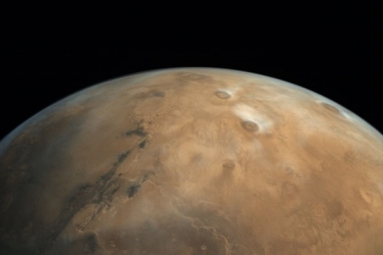
To find the body of facts on the red planet, has been a struggle for the researches to find the physical evidence of iron and calcium on the red planet. Researches found the early atmosphere in ancient surface waters may have been resulted in the form of carbon dioxide in Mars.
There was a question from the long back - Was there life on Ancient Mars? Scientists in the US have found evidence of buried deposits of iron and calcium-rich carbonates on the red planet. By this evidence, researches indicate that there was once had a habitable environment, warmer and wetter with waters on Mars.
“Identification of these ancient carbonates and clay’s on Mars represents a window into history when the climate on Mars was very different from the cold and dry desert of today,” Janice Bishop of the SETI Institute said, liquid water could have a life on Mars once upon a time.
According to scientists, the bedrock of Mars should be full of carbonates and clay’s, this would be evidence that Mars once hosted habitable environment on Mars.
In a recent study of carbonates, they said carbonates can be detected across a broad region because of subsurface materials have been exposed by multiple impact craters and troughs.
“Outcrops in the 450-km wide Huygens basin contain both clay minerals and iron- or calcium-rich carbonate-bearing rocks,” said James Wray, from the Georgia Institute of Technology.
Evidence of finding carbonate bearing rocks in multiple areas across Mars, including Lucaya crater has been highlighted in the recent study. In Lucaya crater, 3.8 billion years old carbonates and clay’s were buried by as much as 5 km of lava and caprock.
The carbonates on the planet were identified by using the Compact Reconnaissance Imaging Spectrometer for Mars (CRISM), which is the Mars Reconnaissance Orbiter.
Through vibration transitions of the molecules in their crystal structure that produce infrared emission to collect the spectral fingerprints of carbonates and other minerals.
The evidence and facts of the global distribution of carbonates are not yet fully resolved and the early climate on the red planet is still subject to find out more.
Mayuka.






















